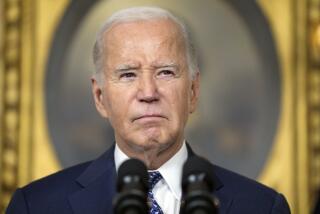Congress Gets Oil-for-Food Inquiry Papers
UNITED NATIONS — Despite strong U.N. objections, a lawyer who recently resigned from a U.N. committee investigating the Iraq oil-for-food program handed Congress documents Thursday that he believes show the committee softened its conclusions in order to protect Secretary-General Kofi Annan.
Robert Parton stepped down last month from the committee led by former U.S. Federal Reserve Chairman Paul A. Volcker to protest what he viewed as the panel’s soft-pedaling of information that might have harmed Annan.
He provided materials to the House International Relations Committee on Thursday in response to an April 29 subpoena and under threat of contempt of Congress if he did not comply. The U.N. contends that Parton had immunity and did not have to turn over the documents.
A second investigator, Miranda Duncan, resigned from the panel for the same reason expressed by Parton, but is not named in the congressional subpoena by International Relations Committee Chairman Rep. Henry J. Hyde (R-Ill.).
The Volcker commission’s March 29 interim report cleared Annan of improperly influencing the award of a lucrative inspection contract to Cotecna Inspection, the Swiss company that had employed his son Kojo. But it also criticized the secretary-general for failing to push an internal inquiry beyond a cursory daylong check into possible conflicts of interest. The report also condemned the shredding of copies of documents related to the oil-for-food program by Annan’s former chief of staff.
Parton has told associates he resigned because he thought the integrity of the investigation had been compromised. He disagreed with the report’s conclusions about Annan’s level of knowledge about the Cotecna contract, incomplete documentation provided by Annan’s staff and what he considered inconsistent standards of proof for adverse findings against Annan.
The documents fill several boxes and include transcripts of four interviews with Annan and some audiotapes, early draft versions of the March 29 report, and notes from meetings that show how Parton thought conclusions were modified and standards changed to buffer the U.N. chief, said a source who has read the documents but did not want to be identified because Congress had not completed its review of the materials.
Parton signed a confidentiality agreement when he joined the committee and received diplomatic immunity as a U.N. “expert on mission” that the world organization said would have shielded him from the congressional order. But the U.N. appears to have little recourse against a U.S. citizen who complies with a congressional subpoena.
The subpoena instructed Parton not to inform the United Nations of the order to hand over the materials, but several Congress members had publicly announced their intentions to subpoena him after he resigned. His lawyer, Lanny Davis, said that the Volcker commission and the world body had failed to respond to requests for legal guidance in the event of a subpoena.
“Mr. Parton has complied with congressional subpoenas as required by law and was made aware that the consequence of defiance would be a finding of contempt of Congress,” said Davis, who served as a White House special counsel for President Clinton.
Susan Ringler, the U.N.’s legal counsel, disputed Davis’ claim that the U.N. did not respond. In a letter to Davis released by the Volcker commission, she wrote that she had told him explicitly that Parton had immunity as a member of the U.N.-appointed committee. She said the subpoena should have been turned over to the United Nations or the committee.
“You apparently chose to ignore the direction provided by the U.N. and the [Volcker] Commission,” Ringler wrote. “Rather than being forthright, you chose to be disingenuous. The committee is reviewing this matter and its options.”
U.N. spokesman Stephane Dujarric said that issues of confidentiality were being dealt with by Volcker committee and congressional investigators, but that Annan had cooperated fully with U.N. panel members.
“It’s clear that the secretary-general has been extremely open with the Volcker investigation,” Dujarric said.
“They’ve had access to him a number of times, they’ve had access to all his files, he’s given them everything. So I don’t know what Mr. Parton has, but on our part the secretary-general has been extremely open and extremely cooperative with the investigation.”
More to Read
Sign up for Essential California
The most important California stories and recommendations in your inbox every morning.
You may occasionally receive promotional content from the Los Angeles Times.










